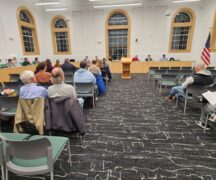By JAN LARSON McLAUGHLIN
BG Independent News
With great decorum, Bowling Green City Council debated a proposed ordinance Monday evening on civility at council meetings.
In May, council member Greg Robinette introduced an ordinance that welcomed robust debate, but forbade threats, insults and intimidation by people addressing council.
The ordinance is not intended to deprive anyone of the right to freedom of expression, Robinette said, but rather to maintain a safe, productive and harassment-free workplace for city staff, and a non-threatening environment for visitors and customers.
But at least one council member worried that an unintended casualty of the ordinance might be the freedom of speech.
“I’m all for civility,” council member Bill Herald said, noting the current lack of civility and respect shown in the nation.
While the ordinance does not intend to deprive anyone of the right to free speech, it comes “uncomfortably close” to infringing on First Amendment rights, Herald said.
Herald objected to the banning of applause or boisterous conduct, and the section limiting the public to just addressing the council president.
“Every person should have access to council,” he said. “It’s uncomfortable, but it’s our government.”
Council President Mark Hollenbaugh said the ordinance would be helpful in making sure he responded in a fair manner to all those addressing council.
“I certainly would find large portions of this useful for me,” he said.
As a high school government teacher for more than 22 years, Hollenbaugh said he holds dear the First Amendment.
“It is my favorite,” along with the 21st Amendment, which repealed prohibition, he joked.
Hollenbaugh also suggested some areas of the ordinance which should be removed, including the portion requiring that the public be seated unless they are speaking at the podium, coming into or leaving the meeting. Sometimes there aren’t enough chairs, and people should not be denied the ability to stand, he said.
Robinette defended the ordinance, and said that it in no way offends the First Amendment. He reviewed similar ordinances that have stood the test of time in many communities, and he read court rulings that supported some limitations in speech.
The public does not have “unfettered freedom to utter whatever is on their mind,” Robinette said. Speeches can be silenced if they are disruptive.
Herald acknowledged that Robinette’s goal was not to infringe on the First Amendment, but “perception matters.”
Council member Jeff Dennis said he supported the ordinance in its entirety, since there have already been three or four occasions this year when inappropriate comments were made during council meetings.
Council member Sandy Rowland suggested that the ordinance be forwarded to a council committee for study, since it did not go through that process prior to being introduced.
The ordinance was amended to take out the section banning boisterous behavior and signs, the requirement to sit, and the limitation of only addressing the president of council.
The vote to approve the ordinance as amended passed with Rowland casting the only opposing vote because she believed it should go through committee review.
Under the new legislation, members of the public will refrain from any behavior that disrupts or threatens to disrupt city government operations, including:
- Insulting, demeaning, intimidating or offensive communications.
- Harassment or intimidation of any city staff, elected official or member of the public.
- Willful destruction or damage of property.
- Conduct that threatens or provokes a violent reaction.
- A continuing pattern of disruptive behavior.
The rules of decorum addressed in the amended ordinance are:
- No person attending a public meeting shall make any threatening, profane, abusive, personal, impertinent or slanderous utterance that disturbs, disrupts or otherwise impedes the orderly conduct of the meeting.
The ordinance also addresses the enforcement of the rules of decorum:
- The presiding officer will be responsible for maintaining the decorum at a public meeting.
- The presiding officer will order anyone violating the rules of decorum to cease any offending conduct.
- If the person continues to violate the rules, they can be ordered to leave.
- If that person refuses to leave, a law enforcement officer can be directed to remove the person from the public meeting.





